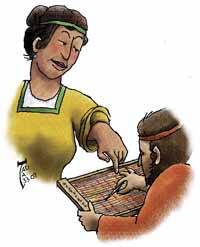Fear of the Lord
In the Bible a beatitude (“Blessed are you/they who…”) declares someone especially happy or fortunate. Yet it may seem odd to call happy or fortunate those who fear the Lord; in this case “fear” is clearly something positive. Today’s Scripture readings can help us clarify what the Bible means by fear of the Lord and how it can be put into practice.
Fear of the Lord is an attitude of proper respect for God, based on a realistic appreciation of who God is and who we are. It expresses itself in actions that are appropriate to a servant of God. Fear of the Lord is not a recipe for passivity and inaction. Rather, it is the beginning of true wisdom.
The capable wife described in Proverbs 31 is praised as one “who fears the Lord.” She is anything but passive. In the ancient Greco-Roman world, the household, at a certain economic level, was the site of what might be described today as a small business, and the woman of the household was the business manager. The woman praised in Proverbs 31 is not only the overseer of a weaving enterprise but she is the one responsible for the care of all the members of the household. She does all things well. This capable woman brings honor to her husband, her family and herself. According to Proverbs 31, the basic reason for her success is fear of the Lord. She knows who she is and why she does what she does. Her many activities are motivated by a proper recognition of who God is and who she is.
In Psalm 128 also, fear of the Lord is the key to human happiness and success. Those who fear the Lord get to experience the good things in life. Here the main character is a husband and father, complementing the sketch of the capable wife in Proverbs 31.
Today’s Gospel text from Matthew 25 is traditionally known as the parable of the talents. It is through this parable that we have come to use the word “talent” to refer to one’s natural and/or God-given abilities. Originally, though, a talent was a large sum of money, something like $100,000. In the parable, a wealthy man going on a journey gives five talents to one servant, two talents to a second servant and one to a third. On his return the man who gave the talents demands an accounting. He finds that the servant given five talents has made five more and that the servant given two talents has made two more. But that the servant who was given one talent buried it in the ground and so made nothing. While the first two are praised and rewarded, the third servant is criticized and condemned. The moral is: Do something positive, constructive and life-affirming with your talents here and now.
The parable suggests that entering God’s kingdom demands appropriate actions motivated by fear of the Lord, understood positively. The first two servants respected and understood their master and did what was positive, constructive and life-affirming with what had been entrusted to them. The third servant, however, who buried his talent in the ground and failed to make anything out of it, succumbed to “fear” in its negative sense and became paralyzed by it. We can assume that if the third servant had done something positive with his one talent, he too would have been praised and rewarded. But he did nothing. In the end he became a victim not of an unjust master but of his own lack of initiative, courage and hope.
The challenge to turn fear of the Lord into positive, constructive and life-affirming action can also be glimpsed in Paul’s instructions to the Thessalonians. These people were being reduced to passivity and inaction by their expectation of the imminent full coming of God’s kingdom. Apparently they believed Christ’s second coming was going to occur very soon. Here again fear in its negative sense reduced good people to inaction. Using an image (“like a thief at night”) found in several other New Testament writings, Paul reminds them that the second coming of Christ will be sudden and unexpected. Therefore he urges them to be prepared always and to be ever vigilant. That means continually acting as “children of the light” by doing what is positive, constructive and life-affirming. In other words, they are to act out of fear of the Lord in its positive sense as the beginning of wisdom.
This article also appeared in print, under the headline “Fear of the Lord,” in the November 10, 2008, issue.








